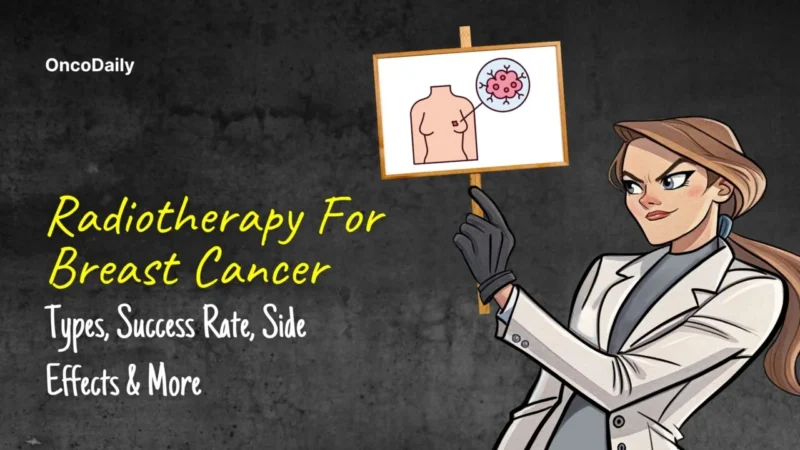
Breast Radiotherapy: Charting the New Courses
Breast radiotherapy is a cornerstone of modern breast cancer treatment, and this field continues to evolve rapidly. This article delves into the recent advancements shaping how we deliver radiation therapy, exploring exciting developments aimed at improving effectiveness, reducing treatment times, minimizing side effects, and personalizing approaches for better patient outcomes.
Pre-Operative Breast Radiotherapy
A 2024 study by Lavigne et al., published in Radiotherapy and Oncology, investigated a novel approach using single-fraction preoperative partial breast irradiation (PBI) for low-risk breast cancer. In this phase I trial, thirteen women aged 65 or older with stage I unifocal luminal A breast cancer received a single 20 Gy dose of PBI, followed by breast-conserving surgery 3 months later.
The results showed a high pathological response rate, with 84.6% of patients achieving pR and a median residual cellularity of just 1%. At a median follow-up of 48.5 months, no recurrences or cancer-related deaths occurred. Acute toxicities were minimal (grade 1 dermatitis and pain). While some grade 2/3 toxicities (fat necrosis, wound infection, hematoma) were observed at 1 year, by 3 years, toxicities were predominantly grade 1, with one case of grade 2 fibrosis. Patient-reported cosmetic outcomes were good or excellent in 60% at 3 years. The authors concluded that this single-fraction preoperative PBI strategy is feasible, relatively well tolerated, and yields a high pR rate, suggesting that a longer interval between radiation and surgery might further improve outcomes.
A 2024 study by Mahmoud et al., published in Radiotherapy and Oncology, evaluated the safety and feasibility of preoperative single-fraction partial breast irradiation (PBI) in elderly patients with low-risk breast cancer. In this single-arm phase II trial, twenty-five women aged 60 or older with unifocal low-risk invasive ductal carcinoma were treated with a single fraction of 20 Gy PBI using VMAT, followed by breast-conserving surgery within 72 hours.
Results at a median follow-up of 60 months showed no surgical complications within 90 days and very low rates of acute and late RTOG skin toxicity (almost all grade 0-1). Cosmetic outcomes were rated as good to excellent in all cases by physicians and patients (with one patient self-rating as fair at year 3). Crucially, there were no recurrences reported. The study concluded that single-fraction preoperative PBI is a safe and feasible option for this patient group, associated with minimal toxicity and excellent cosmetic results, and recommended further randomized trials for comparison with adjuvant PBI.
A 2024 systematic review by Ward et al., published in the Journal of Plastic, Reconstructive & Aesthetic Surgery, examined the outcomes of using pre-operative radiotherapy (PRT) and chemoradiotherapy (PCRT) before mastectomy and immediate breast reconstruction for locally advanced breast cancer. The review aimed to assess clinical, oncological, reconstructive, and aesthetic outcomes based on data from 22 published articles covering 1258 patients with median follow-up ranging from 19 to 212.4 months.
The findings indicated acceptable oncological outcomes, with locoregional recurrence rates between 0–21.7% and overall survival rates between 82.0%–98.3%. Reconstructive outcomes were within normal limits, showing flap loss or necrosis rates from 0–7.6% and revisional procedure rates between 1.9–35.3%. Patient-reported cosmetic outcomes were generally positive in the studies that reported them. The authors concluded that while PRT and PCRT appear feasible with acceptable outcomes, the majority of current studies have low methodological quality and high risk of bias. They emphasized the urgent need for a randomized controlled trial to compare pre-operative versus post-mastectomy radiotherapy in the context of breast reconstruction.
A 2024 phase 2 randomized clinical trial by Schaverien et al., published in JAMA Oncology, evaluated the feasibility and safety of premastectomy radiotherapy (PreMRT) and regional nodal irradiation (RNI) followed by mastectomy and immediate breast reconstruction (IMBR) in patients with breast cancer. Among 49 evaluable patients (median age 48, 94% receiving neoadjuvant therapy), primarily undergoing microvascular autologous flap reconstruction, the study found no complete autologous flap losses. Mastectomy skin flap necrosis occurred in 17% (8/48), with 1 reoperation. At a median follow-up of 29.7 months, there were no locoregional recurrences or distant metastasis. The trial concluded that this treatment sequence is feasible and safe, supporting the initiation of a larger randomized trial comparing hypofractionated vs conventionally fractionated PreMRT.
Omission of Radiotherapy
A 2024 study by Jagsi et al., published in the Journal of Clinical Oncology, investigated whether younger postmenopausal patients with low-risk breast cancer could safely omit adjuvant radiotherapy after breast-conserving surgery and endocrine therapy by using a genomic assay in addition to classic selection factors. This trial was named IDEA.
The single-arm trial prospectively enrolled 200 postmenopausal patients aged 50-69 with pT1N0 unifocal invasive breast cancer (ER+/PR+/HER2-, human epidermal growth factor receptor 2–negative with Oncotype DX 21-gene recurrence score ≤18) who agreed to at least 5 years of endocrine therapy.
At a median follow-up of at least 56 months for 186 patients, the 5-year overall and breast cancer-specific survival rates were both 100%. The 5-year freedom from any recurrence was 99% (95% CI, 96 to 100). Crude rates of ipsilateral breast events were low: 3.3% for patients aged 50-59 and 3.6% for those aged 60-69.
The study concluded that using a genomic assay alongside clinical and biologic features identified a group of patients, including those younger than 60, with a very low risk of recurrence, suggesting that avoiding initial radiotherapy may be an option for a broader population than currently recommended. Long-term follow-up is needed to confirm these findings.
The PROSPECT trial, a prospective, multicentre study by Mann et al. published in The Lancet in 2024, investigated whether a combination of preoperative breast MRI and postoperative pathology could identify older postmenopausal women with low-risk breast cancer who could safely omit adjuvant radiotherapy after breast-conserving surgery. The study included 201 patients aged 50 or older with cT1N0 non-triple-negative breast cancer deemed unifocal on MRI and confirmed as pT1N0 or N1mi after surgery, who then omitted radiotherapy.
Results showed a low 5-year ipsilateral invasive recurrence rate of 1.0% (upper 95% CI 5.4%) in the radiotherapy omission group. Only two local recurrences occurred within the entire follow-up period. The study also found that MRI detected additional occult malignant lesions in 11% of patients. The PROSPECT pathway was found to be cost-effective, increasing quality-adjusted life-years and saving costs per patient. The findings suggest that using MRI and pathology can identify patients with truly localized disease who have a very low risk of recurrence and may safely avoid radiotherapy
Endocrine Therapy vs. Radiotherapy
An interim analysis of the phase 3 EUROPA trial by Meattini et al., published in The Lancet in 2025, compared single-modality radiotherapy (RT) versus endocrine therapy (ET) for older adults (≥70 years) with low-risk, early breast cancer after breast-conserving surgery. Evaluating health-related quality of life (HRQOL) at 24 months among 207 patients (median age ~74-75), the study found a smaller reduction in global health status scores with RT (-3.40) compared to ET (-9.79), with an adjusted difference of 6.39 favoring RT (p=0.045).
Treatment-related adverse events were less frequent in the RT group (67% vs 85%), with common grade 3-4 events like arthralgia and fatigue seen in the ET group but not RT. These interim results suggest RT might better preserve HRQOL, but final disease control data are needed for definitive conclusions.

Read OncoDaily’s Special Article About Breast Radiotherapy
Written By Aren Karapetyan, MD
-
Challenging the Status Quo in Colorectal Cancer 2024
December 6-8, 2024
-
ESMO 2024 Congress
September 13-17, 2024
-
ASCO Annual Meeting
May 30 - June 4, 2024
-
Yvonne Award 2024
May 31, 2024
-
OncoThon 2024, Online
Feb. 15, 2024
-
Global Summit on War & Cancer 2023, Online
Dec. 14-16, 2023
